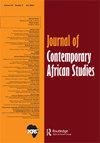塔马利大都市区的国内维和实践
IF 0.8
Q2 AREA STUDIES
引用次数: 0
摘要
本文通过考察加纳北部地区首府塔马利的国际维和与当地警务之间的联系,有助于理解非洲城市的地方安全实践。报告使用集合的概念表明,虽然在Tamale的地方警务中可以发现从持续参与联合国维持和平行动中获得的经验、技能和教训,但它们对日常警务的影响实际上是有限的。这是由于传统当局在地方安全方面的中心作用以及对警察事务的普遍政治干预。Tamale的地方治安是正式(警察和军队)和非正式(酋长和社区领袖)安全安排的集合,特别是后者决定了应该如何处理犯罪。这使得警方几乎不可能在不受干扰的情况下完成工作。本文探讨了非国家或传统行为体如何影响塔马利的治安和安全保障,以及警察在维和特派团中使用他们认为学到的技能的空间。本文通过实证分析表明,地方警务如何更多地受到亲属关系和政治的影响,而不是国际人权和民主原则的影响。本文章由计算机程序翻译,如有差异,请以英文原文为准。
Domestic Peacekeeping Practices in the Tamale Metropolis
This article contributes to understanding local security practices in urban Africa by examining links between international peacekeeping and local policing in Tamale, the capital of Ghana’s Northern Region. It uses the concept of assemblage to suggest that while experiences, skills and lessons gained from consistent engagement in United Nations peacekeeping may be detected in local policing in Tamale, their effects on everyday policing are in practice limited. This is due to the central role of traditional authorities in local security and general political interference in police matters. Local policing in Tamale is an assemblage of formal (police and military) and informal (chiefs and community leaders) security arrangements, with the latter, especially, dictating how crimes should be dealt with. This makes it next to impossible for the police to do their job without interference. The article examines how non-state or traditional actors shape policing and security provision in Tamale, and what space is available for police officers to use the skills they believe they have learned in peacekeeping missions. The paper shows through empirical analysis how local policing is shaped more by kinship and politics than international principles of human rights and democracy.
求助全文
通过发布文献求助,成功后即可免费获取论文全文。
去求助
来源期刊

Journal of Contemporary African Studies
AREA STUDIES-
CiteScore
2.20
自引率
0.00%
发文量
18
期刊介绍:
Journal of Contemporary African Studies (JCAS) is an interdisciplinary journal seeking to promote an African-centred scholarly understanding of societies on the continent and their location within the global political economy. Its scope extends across a wide range of social science and humanities disciplines with topics covered including, but not limited to, culture, development, education, environmental questions, gender, government, labour, land, leadership, political economy politics, social movements, sociology of knowledge and welfare. JCAS welcomes contributions reviewing general trends in the academic literature with a specific focus on debates and developments in Africa as part of a broader aim of contributing towards the development of viable communities of African scholarship. The journal publishes original research articles, book reviews, notes from the field, debates, research reports and occasional review essays. It also publishes special issues and welcomes proposals for new topics. JCAS is published four times a year, in January, April, July and October.
 求助内容:
求助内容: 应助结果提醒方式:
应助结果提醒方式:


